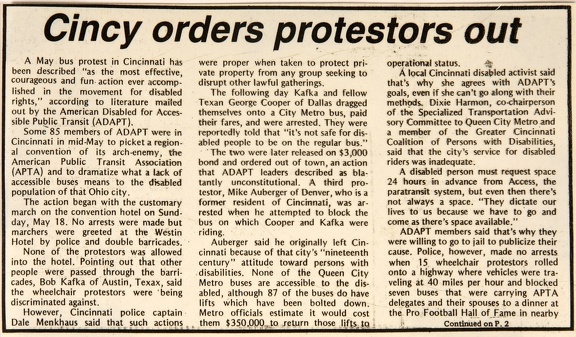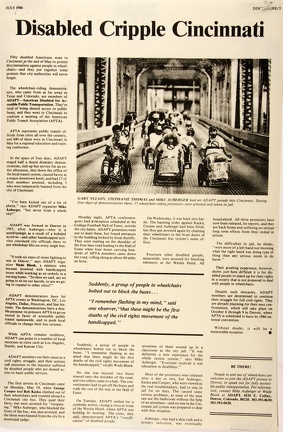- Vali keelAfrikaans Argentina AzÉrbaycanca
á¥áá áá£áá Äesky Ãslenska
áá¶áá¶ááááá à¤à¥à¤à¤à¤£à¥ বাà¦à¦²à¦¾
தமிழ௠à²à²¨à³à²¨à²¡ ภาษาà¹à¸à¸¢
ä¸æ (ç¹é«) ä¸æ (é¦æ¸¯) Bahasa Indonesia
Brasil Brezhoneg CatalÃ
ç®ä½ä¸æ Dansk Deutsch
Dhivehi English English
English Español Esperanto
Estonian Finnish Français
Français Gaeilge Galego
Hrvatski Italiano Îλληνικά
íêµì´ LatvieÅ¡u Lëtzebuergesch
Lietuviu Magyar Malay
Nederlands Norwegian nynorsk Norwegian
Polski Português RomânÄ
Slovenšcina Slovensky Srpski
Svenska Türkçe Tiếng Viá»t
Ù¾Ø§Ø±Ø³Û æ¥æ¬èª ÐÑлгаÑÑки
ÐакедонÑки Ðонгол Ð ÑÑÑкий
СÑпÑки УкÑаÑнÑÑка ×¢×ר×ת
اÙعربÙØ© اÙعربÙØ©
Avaleht / Albumid / Märksõnad Bob Kafka + march
+ march + George Cooper
+ George Cooper + cross
+ cross 2
2

 ADAPT (250)
ADAPT (250)
Cincy orders protesters out A May bus protest in Cincinnati has been described “as the most effective, courageous and fun action ever accomplished in the movement for disabled rights," according to literature mailed out by the American Disabled for Accessible Public Transit (ADAPT). Some 85 members of ADAPT were in Cincinnati in mid-May to picket a regional convention of its arch-enemy, the American Public Transit Association (APTA) and to dramatize what a lack of accessible buses means to the disabled population of that Ohio city. The action began with the customary march on the convention hotel on Sunday, May 18. No arrests were made but marchers were greeted at the Westin Hotel by police and double barricades. None of the protestors was allowed into the hotel. Pointing out that other people were passed through the barricades, Bob Kafka of Austin, Texas, said the wheelchair protestors were being discriminated against. However, Cincinnati police captain Dale Menkhaus said that such actions, were proper when taken to protect private property from any group seeking to disrupt other lawful gatherings. The following day Kafka and fellow Texan George Cooper of Dallas dragged themselves onto a City Metro bus, paid their fares, and were arrested. They were reportedly told that “it’s not safe for disabled people to be on the regular bus.” The two were later released on $3,000 bond and ordered out of town, an action that ADAPT leaders described as blatantly unconstitutional. A third protestor, Mike Auberger of Denver, who is a former resident of Cincinnati, was arrested when he attempted to block the bus on which Cooper and Kafka were riding. Auberger said he originally left Cincinnati because of that city's “nineteenth century” attitude toward persons with disabilities. None of the Queen City Metro buses are accessible to the disabled, although 87 of the buses do have lifts which have been bolted down. Metro officials estimate it would cost them $350,000 to return those lifts to operational status. A local Cincinnati disabled activist said that's why she agrees with ADAPT’s goals, even if she can't go along with their methods. Dixie Harmon, co-chairperson of the Specialized Transportation Advisory Committee to Queen City Metro and a member of the Greater Cincinnati Coalition of Persons with Disabilities, said that the city’s service for disabled riders was inadequate. A disabled person must request space 24 hours in advance from Access, the paratransit system, but even then there's not always a space. “They dictate our lives to us because we have to go and come as there's space available.” ADAPT members said that's why they were willing to go to jail to publicize their cause. Police, however, made no arrests when 15 wheelchair protestors rolled onto a highway where vehicles were traveling at 40 miles per hour and blocked seven buses that were carrying APTA delegates and their spouses to a dinner at the Pro Football Hall of Fame in nearby Canton. Police were caught by surprise, as they had barricades to turn back protestors at the entrance to the Hall of Fame. Two local disabled leaders who were accompanying the APTA delegation to the dinner were taunted as “Uncle Toms” in front of TV cameras. Early the next day ADAPT members were back in front of the Weston Hotel where they erected a huge cross and hung a wheelchair from it in a mock crucifixion. On the final day of the convention, 17 protestors were arrested when they blocked the hotel driveway and refused police orders to move. Many of those arrested were ordered to jail unless they agreed to leave town. Three protestors, Auberger, Cooper and Kafka, decided the time had come for disabled protestors to do “hard time” and ended up serving 10 days. Five other protestors were turned out of jail because they had special medical problems or speech impairments. Others were released after pleading “no contest” to the charges in hastily organized trials. “Even the story we had left town and the protest was over made TV news," an ADAPT spokesperson said. ADAPT (260)
ADAPT (260)
JULY 1986 Disclosure Disabled Cripple Cincinnati PHOTO: A march of people in wheelchairs across a metal bridge that looks like a giant erector set. Three across lead the march, and behind you can see others in an almost single file line. On right, Mike Auberger with his braids and headband rides an electric chair, and has a poster across his legs "Give me a lift, not the SHAFT." In the center, Stephanie Thomas with a bush of hair and a sign that reads "Access is a Civil Right", pushes her manual in a wheelie. On the left, Cincinnatian Gary Nelson, rides his manual as Babs Johnson pushes him. She is looking to her right talking with someone in line. Behind and between Mike and Stephanie, Rick James is visible, riding laid back in his powerchair. Others are behind in line, but the focus is not deep enough to make them out. Caption reads: GARY NELSON, STEPHANIE THOMAS and MIKE AUBERGER lead an ADAPT parade into Cincinnati. During four days of demonstrations there, 17 wheelchair riding protestors were arrested and taken to jail. Fifty disabled Americans went to Cincinnati at the end of May to protest discrimination against people in wheelchairs—and they put together some protests that city authorities will never forget. The wheelchair-riding demonstrators, who came from as far away as Texas and Colorado, are members of ADAPT— American Disabled for Accessible Public Transportation. They're tired of being denied access to public buses, and they went to Cincinnati to confront a meeting of the American Public Transit Association (APTA). APTA represents public transit officials from cities all over the country, and 600 of them were in Cincinnati in May for a regional education and training conference. In the space of four days, ADAPT staged half a dozen dramatic demonstrations, tied up bus service for an entire afternoon, shut down the office of the local transit system, caused havoc at a major downtown hotel, and had 17 of their members arrested, including 3 who were temporarily banned from the city of Cincinnati. “I've been kicked out of a lot of places," says ADAPT organizer Mike Auberger, "but never from a whole city!" ADAPT was formed in Denver in 1983, after Auberger — who is a quadriplegic as a result of a bobsled accident — and other handicapped activists convinced city officials there to put wheelchair lifts on every single bus. “It took six years of street fighting to win in Denver," says ADAPT organizer Wade Blank, a minister who became involved with handicapped issues while working as an orderly in a nursing home. “So then we said, are we going to sit on our laurels, or are we going to expand to other cities?" ADAPT demonstrators have hit APTA events in Washington, DC, Los Angeles, Dallas, Houston, and San Antonio. The demonstrations have a double purpose: to pressure APTA to go on record in favor of accessible public transit nationwide, and to push local officials to change their bus systems. While APTA remains stubborn, ADAPT can point to a number of local successes in cities such as Los Angeles, Seattle, and Kansas City. ADAPT members see their cause as a civil rights struggle, and their actions call attention to the injustice suffered by disabled people who are denied access to basic public services. The first arrests in Cincinnati came on Monday, May l9, when George Cooper and Bob Kaska climbed out of their wheelchairs and crawled aboard a Cincinnati city bus. They paid their fares, but were arrested for “trespassing.” Mike Auberger, who blocked the front of the bus, was also arrested, and the three were banned from the city by a municipal judge. Monday night, APTA conference-goers had a reception scheduled at the College Football Hall of Fame, outside the city limits. ADAPT protestors went out to meet them, but found entrances to the building locked by local sheriffs. They were waiting on the shoulder of the four lane road leading to the Hall of Fame when four buses carrying hundreds of APTA members came down the road, rolling along at about 40 miles an hour. Suddenly, a group of people in wheelchairs bolted out to block the buses. “l remember flashing in my mind that these might be the first deaths of the civil rights movement of the handicapped," recalls Wade Blank. No one was injured: two buses steered onto the shoulder of the road, and two others came to a halt. The conventioneers had to get off the buses and walk the rest of the way to the Hall of Fame. On Tuesday, ADAPT settled for a symbolic action, raising a cross in front of the Westin Hotel, where APTA was holding its meeting. The cross, they said, demonstrated APTA's “crucification" of disabled people. On Wednesday, it was back into battle. The banning order against Kaska, Cooper and Auberger had been lifted, but they got arrested again by chaining their wheelchairs to the front doors of the Cincinnati bus system’s main offices. Fourteen other disabled people, meanwhile, were arrested for blocking entrances at the Westin Hotel. All seventeen of them wound up in a classroom at the city jail. "It was definitely a new experience for the whole justice system,” says Mike Auberger. “Everyone received a real education in disabilities." Most of the protesters were released after a day or two, but Auberger, Kaska and Cooper, who were viewed as the real troublemakers, had to stay in jail for six days. This caused some serious problems, as none of the men can use the bathroom without the help of an attendant—and no one in the Cincinnati jail system was prepared to deal with that situation. Auberger, who had a skin rash and a urinary infection, was eventually hospitalized. All three protestors have now been released, he reports, and they are back home and suffering no serious long term effects from their ordeal in prison. The difficulties in jail, he thinks, “were more of a left hand not knowing what the right hand was doing type of thing than any serious intent to do harm." Their grueling experience, however, shows just how difficult it is for disabled people to stand up for their rights in a society that is not prepared to deal with people in wheelchairs. Despite such obstacles, ADAPT members are determined to continue their struggle for full civil rights. They are already planning for their next confrontation, which will take place on October 6 through 9 in Detroit, where APTA is scheduled to have its 1986 national convention. Without doubt, it will be a memorable occasion. HIGHLIGHTED TEXT: Suddenly, a group of people in wheelchairs bolted out to block the buses. . . “I remember flashing in my mind, ” said one observer, “that these might be the first deaths of the civil rights movement of the handicapped. ” BOXED TEXT BELOW ARTICLE: BE THERE! People in and our of wheelchairs are welcome to join the ADAPT protest in Detroit, to speak out for fully accessible public transportation. For information, contact Mike Auberger or Wade Blank at ADAPT, 4536 E. Colfax, Denver, Colorado, 80220. 303-393-0630 303-393-0630.